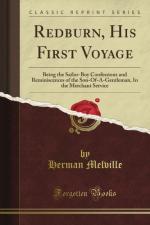|
This section contains 3,170 words (approx. 11 pages at 300 words per page) |

|
SOURCE: Pry, Elmer R. “Redburn and the ‘Confessions.’” American Transcendental Quarterly 43 (summer 1979): 181-88.
In the following essay, Pry contends that Melville's novel, centered on a theme of Christian brotherhood, is far more unified than many critics and readers assume.
Melville's critics have always been much kinder to Redburn than was its author, who insisted that the book was “trash,” written only “to buy some tobacco with.”1 Most critics have in fact rather liked the story of young Wellingborough Redburn's series of disillusionments as he enters the world of experience, and they have found this novel of initiation notable for its comfortably comic tone, as the more mature Redburn looks back upon and gently mocks his younger self setting out upon the “first voyage.” Some readers, too, have found the book interesting for its symbolism, particularly for the glass ship, for the series of guidebooks young Redburn turns to...
|
This section contains 3,170 words (approx. 11 pages at 300 words per page) |

|


